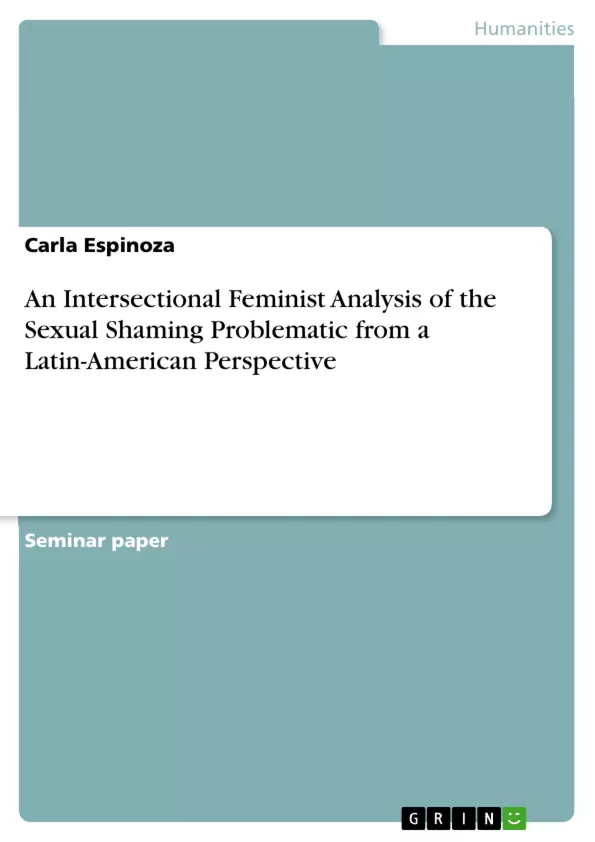This paper aims to provide an analysis and deconstruction of the corresponding dimensions to investigate the extent of the influence of the Latino heteropatriarchy-oriented consciousness in the problematic regarding sexuality and shame represented in "The Poet X", while using an intersectional feminist approach and from a Latin-American perspective that takes into account the power relations, cultural norms and religion pressure inherited from the colonialism movement.
Accordingly the key concepts of intersectional feminism and the role of intersectionality in children and young adult literature will be discussed more in detail. Subsequently, the second chapter will deal with the analysis of the dimensions of culture, gender and race and their role in an intersectional identity, as well as the explanation for the Latino colonial background and its effects on women’s lives. Then, mainly focusing on the protagonist Xiomara and her mother Mami, chapter three will explore the core subjects of the construction and perception of the female body, lack of sex dialogue and sexism in the family environment, and the forms of sexual empowerment and emancipation in the story, after which the conclusions will be presented.
Inhaltsverzeichnis (Table of Contents)
- Introduction
- General Introduction
- Key concepts: Intersectionality and Intersectional Feminism
- Intersectionality in children and young adult literature
- Intersectional Identities
- Multi-layered dimensions of culture, gender, race
- A Latin-American perspective: the Latino postcolonial baggage
- Sexuality and Shame in The Poet X
- Conclusions
- References
Zielsetzung und Themenschwerpunkte (Objectives and Key Themes)
This paper aims to analyze and deconstruct the influence of Latino heteropatriarchy-oriented consciousness on the problematic regarding sexuality and shame represented in The Poet X. It will use an intersectional feminist approach from a Latin-American perspective, taking into account power relations, cultural norms, and religious pressure inherited from colonialism.
- The role of intersectional feminism in understanding the experiences of women, particularly Latinx women
- The impact of colonialism and cultural norms on women's lives and perceptions of sexuality
- The portrayal of sexuality and shame in The Poet X through the lens of intersectionality
- The use of literature as a tool for empowerment and emancipation
- The importance of representation and diverse perspectives in children and young adult literature
Zusammenfassung der Kapitel (Chapter Summaries)
The first chapter introduces the concept of intersectionality and its relevance to feminist theory, particularly within the context of children and young adult literature. It highlights the limitations of traditional feminist approaches and emphasizes the importance of recognizing and addressing the interconnectedness of different forms of oppression.
The second chapter examines the multifaceted dimensions of culture, gender, and race as they intersect to form intersectional identities. It specifically explores the Latin-American context and the impact of colonialism on the experiences of Latino women. This chapter highlights the need for a non-Eurocentric perspective to understand Latino feminism and the unique challenges faced by Latino women.
The third chapter delves into the central themes of sexuality and shame in The Poet X, focusing on the protagonist Xiomara and her relationship with her mother, Mami. This chapter analyzes the construction and perception of the female body, the lack of open dialogue about sexuality, and the forms of sexual empowerment and emancipation found within the narrative.
Schlüsselwörter (Keywords)
This analysis focuses on the key terms of intersectionality, intersectional feminism, Latinx feminism, colonialism, sexuality, shame, empowerment, and representation within the context of children and young adult literature. These keywords highlight the intersection of gender, race, culture, and sexuality within the story of The Poet X and its relevance to contemporary feminist discussions.
Frequently Asked Questions
What is the main objective of the analysis of 'The Poet X'?
The paper aims to investigate how Latino heteropatriarchy, cultural norms, and religious pressure influence themes of sexuality and shame in the novel.
What does 'intersectional feminism' mean in this context?
It is an approach that recognizes how different social categories like race, gender, and culture overlap to create unique experiences of discrimination or privilege for Latinx women.
How does colonialism affect the characters in the story?
The paper explores the 'Latino postcolonial baggage,' which includes inherited power relations and religious pressures that shape the perception of the female body and sexuality.
What is the significance of the relationship between Xiomara and Mami?
Their relationship illustrates the lack of sex dialogue and the presence of sexism within the family environment, which are central to the protagonist's struggle with shame.
How is sexual empowerment portrayed in 'The Poet X'?
The novel highlights forms of emancipation where the protagonist learns to reclaim her body and voice, moving beyond societal and familial shaming.
Why is representation in young adult literature important according to the paper?
Diverse representation allows for the deconstruction of traditional norms and provides tools for empowerment for readers from marginalized backgrounds.
- Arbeit zitieren
- Carla Espinoza (Autor:in), 2021, An Intersectional Feminist Analysis of the Sexual Shaming Problematic from a Latin-American Perspective, München, GRIN Verlag, https://www.hausarbeiten.de/document/1162371


